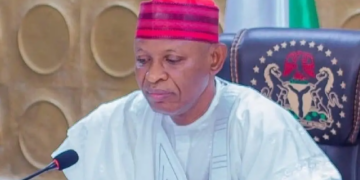As the world marked the 31st remembrance ceremony of the genocide against the Tutsi race in Rwanda yesterday, April 16, 2025, the Rwandan community in Nigeria joined the Ambassador of Rwanda to Nigeria, Amb Christophe Bazivamo, who will hold a solemn gathering at the College of Health and Medical Sciences at Babcock University in commemoration of the unfortunate incident.
Tagged ‘Kwibuka’, a Kinyarwanda word meaning “To Remember,” the commemorative ceremony, which also included students of Babcock University, which has a good number of students of Rwandan origin, reflected on the effect of the genocide and how societies must unite to condemn strife and violence and resolve their differences peacefully.
Amb Bazivamo, who radiated hope, reflected on how the people and the government of Rwanda gradually bounced back and rebuilt the society.
He stated that “the story of Rwanda since 1994 is one of trauma and devastation—but also one of rebirth. The scars of violence were not just physical but emotional, as survivors struggled to heal while living alongside their killers.
“Kwibuka”, a Kinyarwanda word meaning “to remember”, is more than a commemoration. It is a time for reflection, a call for truth, and an invitation to responsibility. We remember the lives lost. We honour the courage of the survivors. And we renew our pledge—never again. For the people of Rwanda, the 7th of April marks the beginning of a season of mourning.
“Despite the enormity of this challenge, Rwanda’s Government of National Unity led by H.E. Paul Kagame deliberately prioritised reconciliation over revenge. This commitment manifested in initiatives like the traditional community-based Gacaca courts, where survivors and perpetrators engaged face-to-face in pursuit of truth and healing. Investing in unity became paramount, and the concept of “Ndi Umunyarwanda” (I am Rwandan) was central to the rebuilding process.
“This emphasised a collective identity transcending ethnic divisions, urging all Rwandans to see themselves as one people, united by their shared history and a common future. This spirit of unity formed the bedrock upon which Rwanda began its journey of healing and rebuilding.
“Building upon this foundation of unity, Rwanda has also strategically invested in education, women’s leadership, and technology-driven progress.
“Today, while challenges remain, Rwanda is moving forward—united, determined, and hopeful.”
President and Vice-Chancellor of Babcock University, Prof Ademola Tayo, tasked the world with striving for an environment where such atrocities never happen again, a world where humanity is valued above all else.
“As we come together to mark this occasion, I urge us all to focus on what unites us rather than what separates us. Let us reject the forces of division that seek to tear us apart based on racial, ethnic, gender, or other differences.
“We must strive for a world where such atrocities never happen again: humanity is valued above all else, and we can live in peace, harmony, and mutual respect.
“By working together, we can help support the survivors and the international community to promote peace, justice, and human rights worldwide.
We must commit to promoting tolerance, understanding, and inclusivity to achieve this. We must pledge to continue educating ourselves and others about prejudice’s dangers and empathy’s importance. We must stand together against injustice and support those affected by violence and oppression.
“As we commemorate this occasion, let us renew our commitment to building a more just and compassionate world,” Prof Tayo said.










